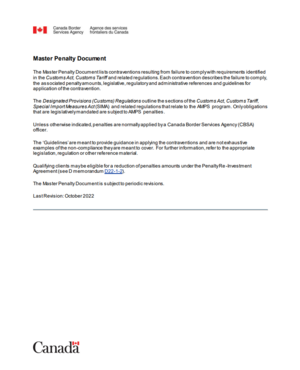Administrative Monetary Penalty System (AMPS) (CBSA)
| This article is part of the Customs Glossary Guide |
The Administrative Monetary Penalty System (AMPS) is an essential component of Canada's border enforcement measures, managed and enforced by the Canada Border Services Agency (CBSA). AMPS is a penalty regime designed to deter non-compliance with customs and trade regulations. Through this system, the CBSA imposes monetary penalties on individuals, importers, carriers, and other entities for violations related to customs, trade, and immigration laws. This article provides an overview of the Administrative Monetary Penalty System and the scenarios in which it is applied.

What is the Administrative Monetary Penalty System (AMPS)?
The Administrative Monetary Penalty System (AMPS) is an enforcement tool used by the CBSA to address non-compliance with various customs and immigration laws, as well as trade and border regulations. It is an alternative to criminal prosecution and provides a more efficient and cost-effective means of enforcing compliance. The CBSA employs AMPS to ensure the integrity of Canada's borders and maintain the smooth flow of legitimate trade while deterring violations.
Scenarios in Which AMPS is Used:
Customs Compliance:
Scenario: Importers fail to declare goods accurately or submit incorrect or incomplete information to the CBSA during the importation process. AMPS Application: AMPS penalties may be imposed for non-compliance with customs declaration requirements, undervaluation of goods, misclassification, or failure to provide necessary documentation.
Trade Compliance:
Scenario: Companies or individuals engage in unfair trade practices, such as dumping or subsidizing goods to gain an unfair advantage in the Canadian market. AMPS Application: AMPS penalties can be applied for violations of Canada's trade remedy laws, including anti-dumping and countervailing duty regulations.
Immigration Compliance:
Scenario: Foreign nationals or individuals attempt to enter Canada without valid travel documents or fail to comply with immigration requirements. AMPS Application: AMPS penalties may be issued for various immigration violations, such as improper entry or failing to comply with visa and work permit conditions.
Carrier Compliance:
Scenario: Carriers, freight forwarders, or transportation companies fail to comply with reporting and clearance requirements for transporting goods and passengers across the border. AMPS Application: AMPS penalties can be imposed for failing to present accurate and timely cargo and conveyance information, leading to border congestion or security concerns.
Other Compliance Issues:
Scenario: Violations related to intellectual property rights, agricultural regulations, and other trade-related offenses. AMPS Application: AMPS may be utilized to address non-compliance with various trade and customs regulations that protect intellectual property rights and ensure the safety of agricultural products.
Conclusion
The Administrative Monetary Penalty System (AMPS) is a crucial tool employed by the Canada Border Services Agency to ensure compliance with customs, trade, and immigration laws. By imposing monetary penalties for violations, AMPS serves as an effective deterrent to non-compliance and reinforces the integrity of Canada's borders and trade system. Importers, carriers, individuals, and businesses engaging in cross-border activities should strive to adhere to all relevant regulations to avoid AMPS penalties and maintain smooth and legitimate trade practices with Canada.